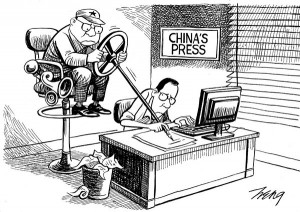The Free Flow of Information
Internet Law In The People’s Republic of China
The People’s Republic of China (hereafter referred to as the “the PRC”) is the world’s most populated country, its oldest civilization. As the PRC’s economy continues to grow and the PRC itself becomes a dominant member of the world’s economy, its people have gained access to information previously unavailable to them. This access comes primarily from the Internet. Now, the PRC is faced with the challenging task of balancing the benefits and detriments of the Internet. Their attempt to do so has included the enactment of strict censorship regulations carrying severe penalties for violators.
The Internet in the PRC
The PRC’s first computer network was not fully established until 1987. This computer network could only be utilized for academic or research purposes. Id. The PRC central government did not allow commercial use of the internet until the mid-1990s. Id. However, in the past decade, the nation’s Internet-using population has reached nearly 60 million people. With the rapid expansion of the Internet, the PRC’s central government has a great need to establish order and stability in determining what it should allow its citizens to view. The PRC’s central government recognizes that in order for its country to continue to grow economically, the Internet must be ever present. The Internet allows for stable intra-country communication, a free flow of technologically based information, and constant access to infinite academic resources. These academic resources allow for the free flow of information. The PRC’s central government at times feels threatened by this free flow of information. Therefore, the government has enacted many regulations in a desperate attempt to control the flow of information throughout the PRC. These regulations are established and enforced through mass government spending. In the past year, the PRC central government has spent nearly 700 million Yuan ($100 million USD) to enforce these various regulations.
Internet Regulations in the PRC
There are three main Internet regulations that have been established and widely enforced throughout the PRC.
- The first regulation is titled “the Temporary Regulation for the Management of Computer Information Network International Connection” and was passed by the 42nd Standing Convention of the State Council on January 23, 1996. Section three of this regulation explicitly states that “The organization of the Ministry of Public Security is responsible for the security, protection and management of computer information networks and the Internet
- The second Internet regulation is titled the “Ordinance for Security Protection of Computer Information Systems” (hereafter referred to as “the Ordinance”). Id. While the first regulation was established to set out specific guidelines for internet use, this regulation is more concerned with the enforcement of these internet regulations. The enforcement of these regulations is carried out by the Ministry. The Ordinance allows for the investigation and prosecution of regulation violations. Id. Article Four of the Ordinance focuses on safeguarding “national affairs, economic construction, national defense, construction, and advanced science and technology” within the computer information systems
- The third regulation is titled the “Computer Information Network and Internet Security, Protection, and Management Regulation” (hereafter referred to as “the Management Regulation”) and was approved by the State Council on December 11th, 1997. This regulation is the first in the PRC to focus specifically on Internet censorship
China moves to tighten control over mobile information sharing
BEIJING – In the cat-and-mouse game of free flow and control of information, China has made its move against the latest information-sharing technology.
China’s Internet Network Information Office on Thursday announced new rules on public accounts for instant messaging services, which say that only established media companies and news portals can release and repost political and social news.
According to a South Korean official who asked not to be named because he was not authorized to speak on the matter, China also has informed South Korea that it has blocked Kakao Talk and Line, two mobile messaging services popular among Asian smartphone users, on the ground that they were used to exchange terrorism-related information.
The moves were widely expected following Beijing’s crackdown on microblogging services after their popularity caught authorities by surprise.






 This is the default footer layout. You can easily add or remove columns in the footer.
This is the default footer layout. You can easily add or remove columns in the footer.
Recent Comments